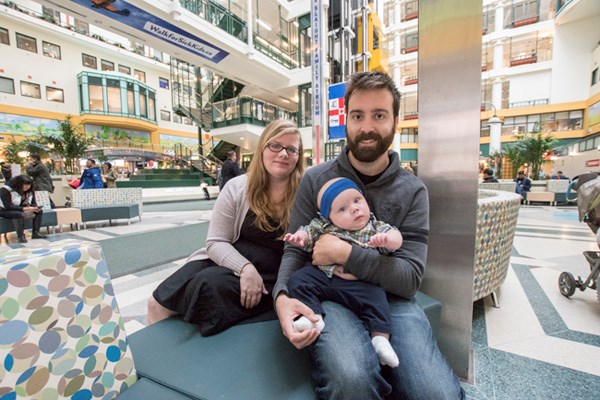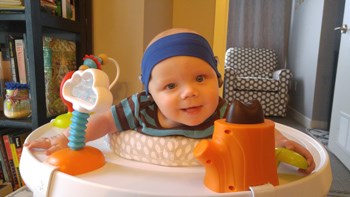Baby Carter recovers hearing after cochlear implant surgery at only 3 months of age
Summary:
A ‘magical life-changing moment’ is how parents describe the day their son Carter’s cochlear implants were ‘turned on’ for the first time. Carter Holland, now six months old, received bilateral cochlear implants when he was just three months of age, and is believed to be the youngest person in Canada to undergo this procedure to restore hearing in both of his ears.
By Ana Fernandes, Intern, Communications and Public Affairs
A ‘magical life-changing moment’ is how parents Stephanie Visser and Adam Holland describe the day their son Carter’s cochlear implants were ‘turned on’ for the first time. Carter Holland, now six months old, received bilateral cochlear implants when he was just three months of age, and is believed to be the youngest person in Canada to undergo this procedure to restore hearing in both of his ears.

Twelve days after Carter was born he was rushed to the emergency department at The Hospital for Sick Children (SickKids) with a high fever, which was later diagnosed as meningitis.
As part of the provincial Infant Hearing Program, all babies in SickKids’ neonatal intensive care unit (NICU) undergo hearing screening. In the case of meningitis, hearing loss is a known side effect, so early detection is critical, says Vicky Papaioannou, Audiologist and Associate Director of the Cochlear Implant Program at SickKids. Meningitis can cause the hearing organ, the cochlea, to turn to bone (ossify) meaning Carter would not be a candidate for cochlear implants.
“Carter is a great success story and an example of how our hearing loss intervention program is working,” says Papaioannou. Due to the high risk of hearing loss associated with meningitis, in 1997, Papaioannou and the Otolaryngology team developed a protocol to quickly assess the hearing of children with bacterial meningitis at SickKids. This streamlined the process from hearing loss identification to cochlear implant surgery in just six weeks, avoiding the risk of cochlear ossification which prevents implantation of the electrode.
Before meningitis vaccination in the early 2000s, SickKids performed around five cochlear implant surgeries a year due to meningitis complications, now we see less than one to two cases a year, explains Papaioannou.
“Carter had spent weeks in the NICU, so our main concern was naturally the meningitis and that he would live. When we were first told that he had lost his hearing, we were shocked but it didn’t really sink in. It wasn’t until we were discharged home and trying to play and interact with him did we realize that he seemed very absent and didn’t look at us very much. It hit us then that he couldn’t hear us or the world around him,” says Stephanie.

With his other health issues stabilized, Carter was discharged from SickKids’ NICU in late May. He went into surgery to receive his cochlear implants on July 31, 2017 and had them activated or ‘turned on’ a month later on Aug. 28, 2017. “In a matter of minutes he went from staring blankly, not focusing on anything around him to giggling and responding to our voices. It was amazing, absolutely life-changing. As soon as we got him back home, we noticed him actively engaged, looking at us, reaching for things. It was a complete, night-and-day change.”
At six months old, Carter is doing well and regularly comes to SickKids for physiotherapy and other appointments to ensure he’s meeting all his developmental milestones. He was recently fitted for a special helmet to address a mild case of plagiocephaly (flat head syndrome), that will also accommodate the external speech processor of the cochlear implants.
SickKids Cochlear Implant Program performs about 100 cochlear implantations per year in children of all ages. For most cases of severe to profound hearing loss, either congenital or acquired, it is ideal to do the surgery before speech has developed at around eight months. Due to Carter’s unique case, the team responded more quickly.
About The Hospital for Sick Children
The Hospital for Sick Children (SickKids) is recognized as one of the world’s foremost paediatric health-care institutions and is Canada’s leading centre dedicated to advancing children’s health through the integration of patient care, research and education. Founded in 1875 and affiliated with the University of Toronto, SickKids is one of Canada’s most research-intensive hospitals and has generated discoveries that have helped children globally. Its mission is to provide the best in complex and specialized child and family-centred care; pioneer scientific and clinical advancements; share expertise; foster an academic environment that nurtures health-care professionals; and champion an accessible, comprehensive and sustainable child health system. SickKids is proud of its vision for Healthier Children. A Better World. For more information, please visit www.sickkids.ca. Follow us on Twitter (@SickKidsNews) and Instagram (@SickKidsToronto).
Media contacts:
Caitlin Johannesson
The Hospital for Sick Children
416-813-7654, ext. 201436
caitlin.johannesson@sickkids.ca
Suzanne Gold
The Hospital for Sick Children
416-813-7654, ext. 202059
suzanne.gold@sickkids.ca

